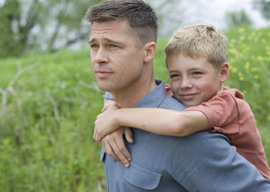
June 02, 2011

Brad Pitt and Hunter McCracken
Not having liked a Malick movie in 38 years, I wasn’t terribly optimistic about The Tree of Life. Yet the central 90 minutes are superb. It is filmed in the fragmentary mode of Carroll Ballard’s The Black Stallion and Steven Spielberg’s Empire of the Sun. Dialogue and exposition (and even plot) are minimized. Scenes seem to start randomly, and you have to figure out for yourself what’s going on.
Yet the seemingly careless shots of three young brothers’ daily lives snare images of indelible beauty. As Pitt explained at Cannes, Malick is “like a guy with a big butterfly net, waiting for a moment of truth to go by.” Pitt plays an inventor who had to give up his dreams of being a classical concert pianist to support his three sons and lovely young wife (Jessica Chastain, who appears gawky in still photos but looks like a pre-Raphaelite Madonna here).
If you want to show the younger generation why it was more fun to grow up free-range, before upper-middle-class children were constantly chauffeured to self-improvement activities, The Tree of Life is the film.
The cinematography is by Mexico City cameraman Emmanuel Lubezki, responsible for the innovative, free-floating long takes that overwhelmed 2006’s Children of Men. Here his technique is less obtrusive. He keeps his lens at the young brothers’ eye level as they wander the woods and goof off in their spacious backyard. At first, the camerawork seems casual in the contemporary quasi-documentary style, but the composition and lighting are monumental.
If you like this style (and I do, very much), The Tree of Life might call to mind other works about growing up such as Wordsworth’s The Prelude, Twain’s Huckleberry Finn, or Nabokov’s Speak, Memory. Parts of it are that good.
Unfortunately, Malick wasn’t content with a small masterpiece. He’s wrapped his little movie in grandiose footage originally intended for an IMAX science documentary on the birth of the universe. To devise the astrophysical and microbial footage about life’s origins, Malick called back to moviemaking Douglas Trumbull, Stanley Kubrick’s special-effects man on 2001. Malick might more resemble, however, another Christian artist with a superb eye for natural beauty, Kubrick’s space-drama rival, Andrei Tarkovsky, director of the 1972 Soviet sci-fi epic Solaris.
Worse, Malick inserts his usual voiceovers, in which the characters whisper questions to God such as “Who are we to you?” and “Why should I be good if you aren’t?” The Tree of Life turns into a Waco Episcopalian’s version of the Sistine Chapel. Not even Malick can pull that off.